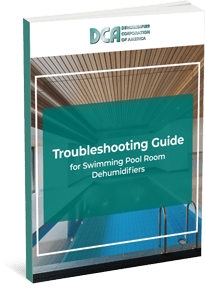Although dehumidifiers are built to endure harsh environments, the average lifespan of a dehumidifier used for industrial and institutional applications is nine to eleven years. It is typically more expensive to keep an aging unit instead of simply replacing the dehumidifier altogether.
At Dehumidifier Corporation of America, we can easily replace an obsolete dehumidifier. With the help of our team of experts, we can help you choose the exact replacement dehumidifier you’re looking for based on your requirements.
Factors to Consider when Replacing your Dehumidifier
Before replacing a dehumidifier, it’s important for the manufacturer or their representative to verify if the new unit is the right one for a specific project. If the unit was sized correctly, the run time for the compressor in the dehumidifier should fall between 60 to 70% of a 24-hour day depending on the time of year as well as the location of the project. The compressor will usually be off when the dehumidifier blower is running to deliver room heating from the primary room heating source.
It’s also important to consider why the original unit failed in the first place. Indicators that contribute to the short running life span of a pool dehumidification system include a lack of maintenance or chemicals stored in the mechanical room. The primary contributor is improper installation, which limits the needed air flow for proper operation of a dehumidification system.
When it comes to swimming pool room dehumidifiers, an owner of many motels/hotels could potentially use the same model of dehumidifier on all their projects even though the requirements vary considerably. With that in mind, it is always best to re-run the loads of the pool room when replacing a dehumidifier because conditions can change from one specific application to another.
Types of Functionality
Generally, the dehumidifier with the least amount of options will better serve the owner compared to a dehumidifier with numerous additional options that provide little or no pay back. When a dehumidifier is providing the primary room heating source, a gas duct heater or hot water coil has proven to be the most cost-effective choice.
While electric duct heaters provide a lower initial cost, the cost of operation can run three to four times the cost of gas alone. Additionally, a large electric panel must be available to drive the electric duct heater. Electronic controls are another viable option, since they don’t need to be purchased from a factory, and instead they are available from a local HVAC wholesaler as “off the shelf items.”
A dehumidifier will often best be served by using an optional top air discharge rather than installing a 90-degree elbow on the discharge to turn the air up or down. Furthermore, a vertical dehumidifier best serves the duct system depending on the amount of room that is available in the mechanical room.
A few other things to consider include:
- Who sized your first unit? Were they the same group that sold you the unit that didn’t work out?
- Did they supply an oversized unit to fulfill other project needs? (i.e. heat pool water)
- Has the person that sourced the original unit left? Have you examined why they selected that original unit?
- Who installed the original unit and was it properly sized?
- Was the wrong unit specified and then used across a handful of installations?
- Have you considered what features you may need that your original unit didn’t have?
Direct Replacement Units and the DCA Difference
DCA offers the most models in the 1.5 to 10.0 nominal ton range. Our units easily replace existing applications and may not require users to alter or remodel existing duct work. We work directly with you by examining your needs and providing an optimized solution for your specific application
With over 35 years of experience, DCA is an industry leader in dehumidification systems. To learn more about proper maintenance techniques and factors to look for with an aging dehumidifier, be sure to download our eBook, 5 Signs That It’s Time to Replace Your Dehumidifier. You can also contact us today to learn more about our various dehumidifier models and our cost-saving innovations.






